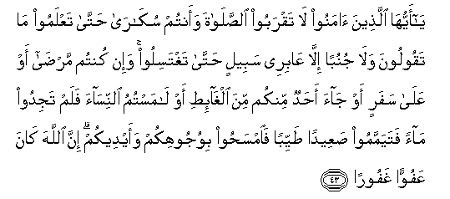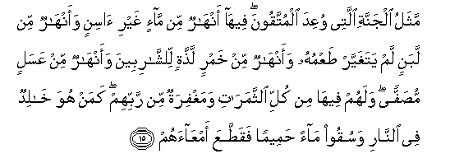LRTQ2: Intoxicating Rhetoric
Technorati tags: Quran, Reading, Blog Campaign, Kartika Sari Dewi Shukarno, Alcohol
Updated: Correction of some details pertaining to the Kartika case.
 Out of the blue, Kartika Sari Dewi Shukarno has suddenly become a household name. The part-time model was caught drinking beer, charged and subsequently sentenced to the maximum sentence allowable by Pahang shariah law. Despite the fact that she admitted guilt, and has shown remorse for what she did. Her husband was not with her at the time.
Out of the blue, Kartika Sari Dewi Shukarno has suddenly become a household name. The part-time model was caught drinking beer, charged and subsequently sentenced to the maximum sentence allowable by Pahang shariah law. Despite the fact that she admitted guilt, and has shown remorse for what she did. Her husband was not with her at the time. who was with her at the time, was not charged with anything. Why this is so is not for Walski to speculate She was, however, with other friends who let let off because they were non-Muslims.
But the point is that Kartika case has set a precedent – the first person to be whipped for the offence of public drinking. And she’s requested it to be a public whipping – another precedent. Her request was not meant as a challenge to the system, only that she wants it to be over and done with, so that she can get on with her life.
Since this is the hot topic for the moment, Walski thought that it would be appropriate to kick off the LRTQ2 campaign with a look at what exactly the Quran states about alcohol. Or, to be more precise, intoxicants, which covers a whole range of other things as well.
There are roughly 6 instances where the Quran touches on the issue of intoxication, or being drunk, in other words. These occur in surahs 16, 2, 4, 47, and two verses in surah 5, in order of revelation.
Let’s look at them chronologically:
 And of the fruits of the palms and the grapes-- you obtain from them intoxication and goodly provision; most surely there is a sign in this for a people who ponder (Surah 16, Verse 67)
And of the fruits of the palms and the grapes-- you obtain from them intoxication and goodly provision; most surely there is a sign in this for a people who ponder (Surah 16, Verse 67)
In this first verse, there is no injunction, per se, only that being able to obtain both intoxicants and good provisions from the same source should serve as a sign to those who ponder or think.
 They ask you about intoxicants and games of chance. Say: In both of them there is a great sin and means of profit for men, and their sin is greater than their profit. And they ask you as to what they should spend. Say: What you can spare. Thus does Allah make clear to you the communications, that you may ponder (Surah 2, Verse 219)
They ask you about intoxicants and games of chance. Say: In both of them there is a great sin and means of profit for men, and their sin is greater than their profit. And they ask you as to what they should spend. Say: What you can spare. Thus does Allah make clear to you the communications, that you may ponder (Surah 2, Verse 219)
The verse above, from the longest chapter in the Quran (surah Al-Baqarah) is the first time, chronologically, that the mention of intoxicants as being bad is made.
But is there any punishment ordained? Not in 2:219. But surely, being that shariah codes the world over contain punishment for consuming alcohol (and other intoxicants), the source of this punishment must have been divinely ordained. Right?
Well, let’s look at the other references found in the Holy Quran.
(the other intoxicating references, and more, in the full post)
 O you who believe! do not go near prayer when you are Intoxicated until you know (well) what you say, nor when you are under an obligation to perform a bath-- unless (you are) travelling on the road-- until you have washed yourselves; and if you are sick, or on a journey, or one of you come from the privy or you have touched the women, and you cannot find water, betake yourselves to pure earth, then wipe your faces and your hands; surely Allah is Pardoning, Forgiving. (Surah 4, Verse 43)
O you who believe! do not go near prayer when you are Intoxicated until you know (well) what you say, nor when you are under an obligation to perform a bath-- unless (you are) travelling on the road-- until you have washed yourselves; and if you are sick, or on a journey, or one of you come from the privy or you have touched the women, and you cannot find water, betake yourselves to pure earth, then wipe your faces and your hands; surely Allah is Pardoning, Forgiving. (Surah 4, Verse 43)
Now this is an interesting verse, because it doesn’t admonish one for being under the influence, only that one should not pray while intoxicated. Even more interesting is that the verse addresses those “who believe” – ya aiyuhal la dzee na aamanu.
Equally interesting is this next verse, which is an allegorical promise of paradise to those who are righteous.
 A parable of the Garden which the dutiful are promised: Therein are rivers of water not altering for the worse, and rivers of milk whereof the taste changes not, and rivers of wine delicious to the drinkers, and rivers of honey clarified; and for them therein are all fruits and protection from their Lord. (Are these) like those who abide in the Fire and who are made to drink boiling water, so it rends their bowels asunder? (Surah 47, Verse 15)
A parable of the Garden which the dutiful are promised: Therein are rivers of water not altering for the worse, and rivers of milk whereof the taste changes not, and rivers of wine delicious to the drinkers, and rivers of honey clarified; and for them therein are all fruits and protection from their Lord. (Are these) like those who abide in the Fire and who are made to drink boiling water, so it rends their bowels asunder? (Surah 47, Verse 15)
The final reference, comes from surah 5.
 O ye who believe! Intoxicants and gambling, (dedication of) stones, and (divination by) arrows, are an abomination,- of Satan's handwork: eschew such (abomination), that ye may prosper. (Surah 5, Verse 90)
O ye who believe! Intoxicants and gambling, (dedication of) stones, and (divination by) arrows, are an abomination,- of Satan's handwork: eschew such (abomination), that ye may prosper. (Surah 5, Verse 90)
And the next verse right after explains why:
 Satan's plan is (but) to excite enmity and hatred between you, with intoxicants and gambling, and hinder you from the remembrance of Allah, and from prayer: will ye not then abstain? (Surah 5, Verse 91)
Satan's plan is (but) to excite enmity and hatred between you, with intoxicants and gambling, and hinder you from the remembrance of Allah, and from prayer: will ye not then abstain? (Surah 5, Verse 91)
In essence, what the Quran says is this: alcohol and intoxicants are things that you should avoid. For those who have actually experienced the effects of alcohol, the reason is clear. Alcohol, in varying quantities according to the individual, lowers your inhibitions, and may lead you to do and say things you would normally restrain yourself from. In extreme cases, to the detriment of ourselves and those around us.
But where does the notion of punishment (of any worldly kind) for consuming alcohol come from? Well, it’s not from the Quran.
In The Star just over a month ago was an article written by Imam Feisal Abdul Rauf, who among other things, is the founder and chairman of the Cordoba Initiative, an international organization dedicated to improving understanding and relations between the West and the Islamic world.
Walski is of the opinion that it’s useful look at what Imam Feisal wrote, in light of this posting (emphasis by myAsylum).
ON July 20, the Pahang Syariah High Court sentenced part-time model Kartika Sari Dewi Shukarnor, 32, to a RM5,000 fine and six lashes of the rotan for drinking beer.
No doubt the court has the jurisdiction to impose such a sentence as provided by the law.
Some have questioned the appropriateness of the sentence of whipping given that the court has discretion to impose a mixture of fine, imprisonment and binding Kartika over for good behaviour for a certain period, or just admonish her.
Others have questioned the appropriateness based on the legitimate argument that the Syariah holds Muslims responsible for their actions that result in negative opinions of Islam.
A news item like this certainly presents Islam and Malaysia negatively on the international stage.
But I would urge the Malaysian Syariah authorities to seriously reconsider the Syariah basis of this law on the following Syariah grounds:
Neither the Quran nor the Hadith invokes a penalty for alcohol consumption. The sin of consuming alcohol is described in the Quran in the mildest language of prohibition.
When it comes to dietary laws, the Quran commands the believers in Sura 5:3: “forbidden (hurrimat) to you is the dead animal, loose blood, and the flesh of the pig”.
The 90th verse of the same Sura cautions the believers that “wine, gambling, etc, are an impurity so avoid them (fa-jtanibuh)”.
Some legal scholars suggest that the divine command ijtinab, to avoid something, is milder language than tahrim, prohibition.
A Muslim consuming a glass of wine with a pork chop commits a more serious offence in eating pork; yet as there is no Quran or Hadith penalty for consuming pork, there is also none for alcohol consumption.
The question then is how did the penalty for alcohol consumption come about?
It occurred during the time of the second Caliph Umar b. al-Khattab. There was a companion of the Prophet (sahabi) who had fought on the Prophet’s side in his battles.
A heavy drinker, he would walk the streets of Madina drunk at night and loudly shout scandalous things about people. The inhabitants of Madina complained, and Umar formed a committee to decide what to do.
Imam Ali, based on the man having committed slander, suggested the penalty for slander, whose maximum penalty is 80 lashes.
Since that time, this has been considered the maximum penalty for alcohol consumption, based on utilising the Syariah concept of ta`zir (deterrence).
I disagree with this being the mandatory sentence for the offence of wine consumption, because it is the maximum sentence for another, separate offence – slander – albeit committed under the influence of alcohol.
Had the man just fallen on the street in a stupor and suffered a terrible hangover without having hurt anyone, no punishment would have been established.
Had cars existed then and had he run his car over some pedestrians and killed them, should we invoke ta`zir now and have a penalty for alcohol consumption equal to that of accidental manslaughter?
There are additional arguments we can marshal from the Quran and Hadith. The Quran repeatedly urges Muslims to forgive those who wrong them, even for slander and manslaughter!
When the Prophet Mohamed’s wife Aisha was wrongly accused of having committed adultery, her father Abu Bakr sought to have the penalty of libel meted against one of his employees who had slandered her.
God then revealed verse 24:22, urging the believers to pardon and forgive those who have wronged them, so that God would forgive them their own sins.
But I see no evidence that Kartika wronged anybody after drinking beer.
Verse 4:92 gives the penalty for a Muslim accidentally killing another as freeing a slave and paying compensation to the victim’s family – unless the family forgoes compensation and forgives the offender.
And if the defendant can’t afford to pay, then he should fast for two consecutive months. Accidental homicide is a much greater sin than alcohol consumption; yet the Quran suggests that the victim’s family would do well to forgive the offender, and the penalty here is not jail time or corporal punishment, but a two-month fast.
The Quranic and Prophetic teachings are about forgiveness, compassion and positive personal transformation. Sura 48:29 describes Prophet Mohamed’s companions as “firm against unbelievers and compassionate to themselves”, and this is what I urge the Malaysian authorities to exemplify: show compassion to Kartika and forgive her.
But if the Pahang Syariah court insists on establishing a penalty for the mere consumption of alcohol, why not replace the current law – a maximum penalty of a RM5,000 fine and six lashes of the rotan – with spending RM5,000 on feeding the poor and fasting for six days?
Wouldn’t that be more in keeping with the letter and spirit of the Quran and the Prophetic Sunnah?
Were this the case, I have a hunch that many Malaysians who imbibe may voluntarily mete such a “penalty” on themselves – to the benefit of the poor, to the benefit of their own spiritual progress and standing before God on Judgment Day, and to the benefit of the Malaysian Syariah Court’s, Islam’s and Malaysia’s image on the international stage.
(source: The Star)
In essence, the article succinctly articulates what’s on Walski’s mind pertaining to the issue surrounding Kartika Sari Dewi Shukarno, and the bigger picture about laws and punishment regarding alcohol.
There’s no doubt that consuming alcohol (or other intoxicants) is something that’s not looked upon positively by the Quran. By the same token, there is no punishment prescribed by the holy book either. That, and the fact that some verses in the Quran do mention intoxicants in a less than negative light, as we have seen in the ones quoted previously.
What does it all mean, then? Should we be obsessed with punishing those who have transgressed, even when there clearly is no worldly punishment divinely prescribed? If the answer is yes, exactly whose laws are we trying to uphold?
The world has changed and evolved both physically and socially in the last millennium and a half (almost). The Quran was revealed to be relevant for all time, and the way it’s been presented lends credence to that notion.
Perhaps it’s time we returned to the holy book and rediscover the essence of its teachings, relevant to our time. Maintaining a paradigm that’s no longer relevant won’t take us forward. Best case, we stay where we are. But worst case, and more likely, is that we’ll regress. And signs are abundant that what’s happening is indeed regression.
Isn’t it time we took heed?
Walski’s non-alcohol induced related posting footnote: The following LRTQ2 participating blogs have also written about the Kartika Sari Dewi Shukarno case, and other related issues:
- Rantings by MM – LRTQ2: Mercy and Repentance at the Heart of the Quran
- Anas Zubedy – What does the Quran says about Alcohol Consumption?
- OutSyed The Box – Hassan Ali & The Temple of Doom


![Reblog this post [with Zemanta]](http://img.zemanta.com/reblog_e.png?x-id=25b1ab0f-cc5f-454f-b180-eca5c3618944)














